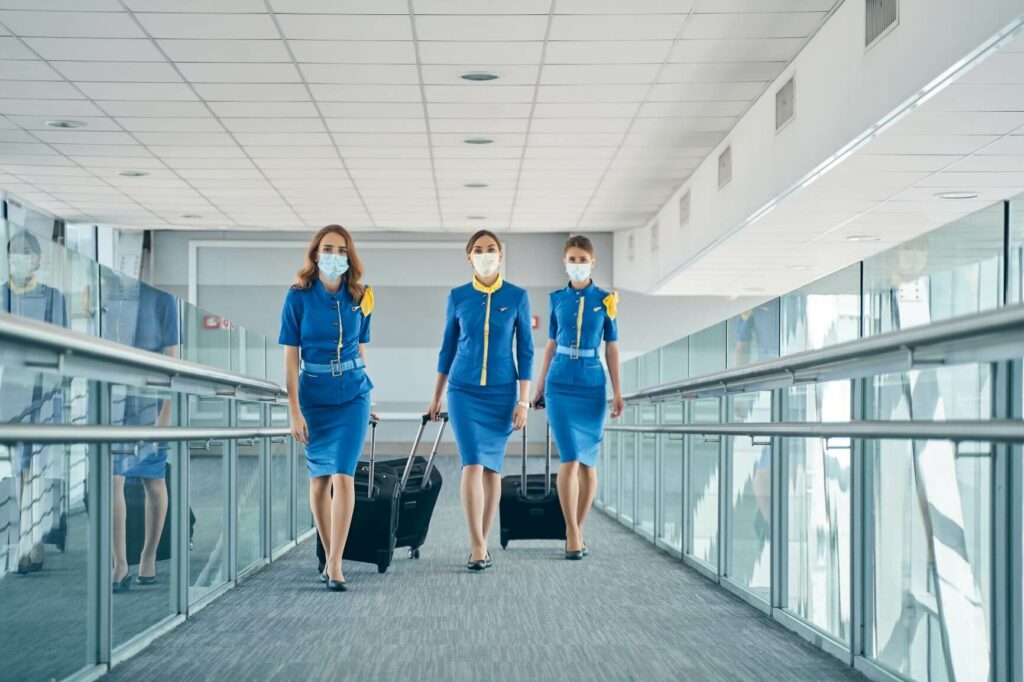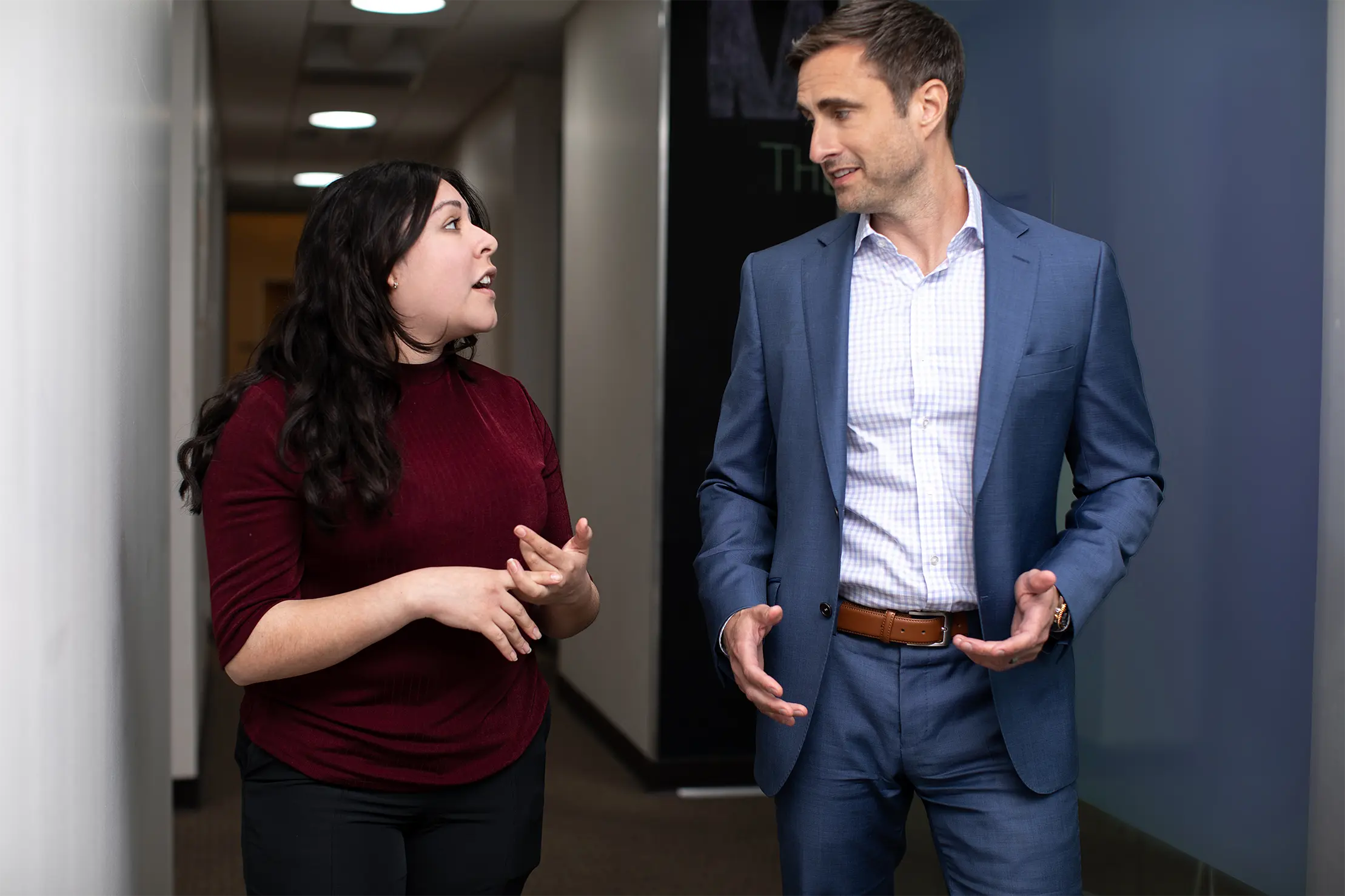Working as a flight attendant offers a schedule far different than what most people deal with on a given day. They work at odd hours of the day and night, have shifts as long as 14 hours, and live and sleep in multiple cities and countries throughout the world. A flight attendant may live in a completely different state than their “home base,” and commute to work by plane.
Their unique, on-the-go lifestyle has made it difficult for legal experts to determine which state’s wage and hour laws protect flight attendants. If a flight attendant is based in California but performs much of their work out-of-state, do California’s laws concerning meal breaks, rest breaks, and overtime still apply?
A 2021 Ninth Circuit court ruling gave us an answer: yes. California-based flight attendants are entitled to meal and rest breaks under California wage and hour laws, even if most of their work is out of state.
Below, our wage and hour attorneys break down how flight attendants are paid, what breaks, wages, and other protections they are entitled to, and how the new court ruling affects a flight attendant’s rights.
Table of Contents
- How are flight attendants paid?
- Do flight attendants get meal and rest breaks?
- Do flight attendants get overtime?
- Do flight attendants get wage statements and waiting time penalties?
- The Bernstein decision, explained
- If you are a flight attendant, what does this mean for you?
How are Flight Attendants Paid?
Flight attendants may be paid hourly or on salary. European airlines tend to pay salaries, where US-based airlines often pay hourly.
A flight attendant’s official clock-in time starts when the boarding door closes and stops when the door opens at the plane’s destination. In industry terms, this is deemed “flight pay” or “block time.”
This means that all the time spent in the airport before boarding the plane, guiding passengers to their seats, doing safety checks, and helping passengers off the plane, is not paid at the flight attendant’s full hourly rate. Instead of regular compensation during this time, flight attendants receive what is called “per diem” time, which is a small amount paid to the employee for every hour they are away from their home base. This small hourly amount (usually $1-$2 per hour) is meant to cover essential expenses, such as meals. (Hotel rooms are almost always paid for by the airline.)
Delta Airlines has begun compensating flight attendants at 50% their regular hourly rate during boarding, but other airlines have yet to follow suit.

Flight attendants have traditionally not been paid while they wait for their flight, nor while they are boarding passengers. Delta has recently started paying flight attendants at 50% their usual rate during boarding, but other companies have yet to follow suit.
Do Flight Attendants Get Meal and Rest Breaks?
Federal regulations currently restrict flight attendants from working over 14 hours in a single workday. Under US law, flight attendants remain on duty during rest breaks.
Under California employment laws, workers must receive a 10-minute break every four hours and a 30-minute meal break every five hours. California law requires employers to allow workers to completely remove themselves from work during their breaks. Failing to do so is a rest break violation, forcing employers to pay the employee one additional hour of pay at their regular rate for each violation.
Many airlines’ current employment model complies with federal regulations, but not California’s. So the question then becomes: which law applies, federal law or California law? The Ninth Circuit ruling in Bernstein v. Virgin America attempts to answer this question.
Do Flight Attendants Get Overtime?
Under the federal Fair Labor Standards Act (FLSA), non-exempt employees are entitled to overtime pay. Most employees considered “exempt” from overtime are salaried and work white-collar jobs—though there are many exceptions.
Under California wage and hour law, flight attendants are non-exempt. This means that flight attendants should make one and a half times their regular pay rate for shifts longer than eight hours, or workweeks longer than 40 hours. (Read more about exempt employees in California in our blog article).
Many companies, including airlines, may try to categorize employees as exempt to avoid paying overtime. However, misclassification under California law may incur stiff penalties against the employer. Again, the question is whether federal or California state law applies to flight attendants who work and/or live in California.
Do Flight Attendants Get Wage Statements and Waiting Time Penalties?
California requires employers to provide employees with regular and comprehensive wage statements. With regard to flight attendants, this law applies in two scenarios:
- If the employee performs the majority of their work in California
- If the employee is based in California, even if they perform the majority of their work elsewhere.
California law also provides for waiting time penalties for employers who fail to promptly pay final wages due to a terminated employee or an employee who resigns with at least three days’ notice. If an employer does not promptly pay these wages, they’re subject to fines and penalties, payable to the employee.
These policies were clarified in two 2020 California Supreme Court cases: Ward v. United Airlines, Inc., and Oman v. Delta Air Lines, Inc. In both cases, the Court held that wage statements and timely payment of wages applied to airline employees that either reported to work in California (were “based” in California) or performed more than 50% of their work in California.
California Wage and Hour Law Applies to Flight Attendants: Bernstein v. Virgin America
As this article has shown, California’s wage and hour laws are much more favorable to employees than federal employment laws. Most airlines have fought for federal employment law to apply to their workers, citing the fact that most airlines operate nationwide or internationally—and that applying one state’s employment laws to flight attendants working outside the state doesn’t make sense.
However, in Bernstein v. Virgin America, Inc., et al., the court held that airlines must abide by California’s wage and hour laws for their California workers. This applies even when most of the work for flight attendants is done out of state.
Virgin America’s Argument
In this case, flight attendants working for Virgin America, formerly based in California, alleged that the airline failed to abide by California’s wage and hour laws. Virgin argued that federal law applied, “preempting” California’s more restrictive state laws. According to Virgin, California state law should not apply to employees that perform work in several states.
The Ninth Circuit’s Decision
However, the court disagreed. A previous case, Sullivan v. Oracle, provided a precedent for their decision. In Sullivan, the court ruled that non-California residents working in California for a California-based employer were entitled to overtime under California’s wage and hour laws. The Ninth Circuit applied the same logic in Bernstein: even if a flight attendant is not based in California, California wage and hour laws apply if more than 50% of their work occurs within California’s borders.
What Sullivan did not answer, however, is whether a California resident’s work outside of California is covered by California wage and hour laws. If a flight attendant lives in California but performs most of their work in another state, do California wage and hour laws apply? The Ninth Circuit said yes. According to their interpretation, the ultimate goal of California wage and hour law is to protect its residents from “the evils associated with overwork.” Failing to protect California residents who work out of state would thwart the purpose of the policy.
Did Virgin America Break California Wage and Hour Law?
Yes and no. The court agreed with the plaintiffs that California wage and hour laws applied to Virgin, and that Virgin failed to comply with California standards for overtime, meal and rest breaks, waiting time penalties, and wage statements.
However, one issue that the plaintiffs raised concerned block time and whether the use of that system violated California’s minimum wage laws. Virgin America paid its flight attendants based on:
- Block time worked each day ;
- Block time spent traveling between airports to reach an assigned flight; and
- Up to three and one half hours of minimum duty if a flight attendant’s block time in one day did not exceed three and one half hours in total
The court found that Virgin America’s specific use of block time did not violate California’s minimum wage standards. Because an airline guaranteed a flight attendant’s block time pay, even if the pay is not specifically tied to each hour of work, the court held that block time pay is still compliant with California wage and hour laws.
If You Are a Flight Attendant, What Does the Bernstein Decision Mean for You?
Based on the Bernstein decision, we can draw several conclusions:
- California wage and hour laws apply to employees who either live in California or complete at least 50% of their work in California.
- The flight attendant “block time” pay model complies with California minimum wage law, but…
- California-based flight attendants are entitled to meal and rest breaks, wage statements, waiting time penalties, and overtime compensation as detailed in California law.
The Ninth Circuit’s ruling brings up as many questions as it does answers, but one point is certain: if you are a California resident or a non-California resident performing the majority of your work as a flight attendant in California, you are entitled to protections under California wage and hour laws.
This is a complex employment law matter. If an airline fails to comply with California wage and hour laws, it’s not the large airline companies that lose out: it’s you, the individual flight attendant. You deserve to be compensated for every minute that you work—and a California employment lawyer can help protect your rights.
If you are a flight attendant in California and think you may have been underpaid, not paid overtime correctly, or not received your meal and rest breaks, you may have legal options. To find out your legal options, contact PARRIS today to speak with an experienced California employment lawyer.


